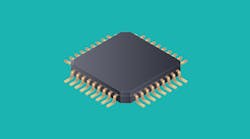Amazon Launches New Graviton Server CPU in Challenge to Intel
AWS is pushing the envelope with a new generation of its Graviton chip for cloud data centers, promising a 25% gain in general-purpose performance over its predecessor while consuming up to 60% less power.
At its annual re:Invent conference, Amazon's cloud computing arm unveiled the Graviton3 that is designed to take on central processing units (CPUs) for massive data centers from Intel and AMD. AWS said the chip would run a new series of cloud services, or instances, that customers can use to cycle through computing jobs such as electronic design automation, media encoding, scientific modeling, and machine learning.
Amazon Web Services (AWS) has become the world's largest cloud computing vendor by building data centers and renting out that remote computing power to clients. As a result, it is also one of the largest buyers of server chips that can cost up to tens of thousands of dollars each on the high end. So for several years, it has worked on building faster and cheaper chips specifically for its vast warehouses of servers.
Amazon's CPUs are based on Arm blueprints that are also the gold standard in smartphone chip designs. But it has not been announced whether the Graviton3 CPU uses Arm's off-the-shelf Neoverse server cores or custom cores designed in-house, in the mold of the A- and M-series chips in Apple's iPhones and Macs.
In 2015, AWS purchased Arm server chip startup Annapurna Labs to fire up its processor design work. AWS rolled out the first generation of its internally-designed Graviton chip in late 2018 and followed it up with the second generation, Graviton2, a year later to try to eat into Intel's dominance in server chips. AWS has said Graviton-backed cloud services would cost significantly less than alternatives based on Intel Xeon CPUs.
Despite its chip-making ambitions, AWS remains a top customer at Intel and AMD and continues to work closely with the semiconductor giants. AWS offers a wide range of cloud services running on Intel's Xeon and AMD's EPYC chips, giving customers the flexibility to choose the processor that fits their requirements.
But the release of three new generations of server chips in three years shows that AWS is serious about bringing more competition to the data center arena and wants to keep closing the gap with Intel and AMD.
Working against AWS is the fact that decades of software are designed to run on Intel and AMD's server processors, which are based on the X86 instruction set architecture (ISA). So customers that want to try Amazon's Graviton CPUs for the first time have to overhaul their software to run on the Arm architecture.
"With our investments in AWS-designed chips, customers have realized huge price-performance benefits for some of today's most business-critical workloads," Dave Brown, Amazon's VP of Elastic Compute Cloud said. "AWS's continued innovation means customers are now getting brand new, game-changing instances to run their most important workloads with significantly better price-performance than anywhere else."
AWS said Graviton3, on top of its general-purpose performance gains, also has twice the performance for floating-point operations and cryptography work. The chip can also carry out machine-learning chores three times faster. The Graviton3 chip also supports 20% more networking bandwidth than Graviton2, AWS said, and it is able to communicate directly with server networking cards called NICs, keeping latency in check.
Amazon said cloud instances based on Graviton3 use DDR5 memory for the first time in the cloud market, The technology brings 50% higher bandwidth than the DDR4 memory in its previous Graviton2 generation.
For now, Graviton3 is only available as a preview, AWS said.

